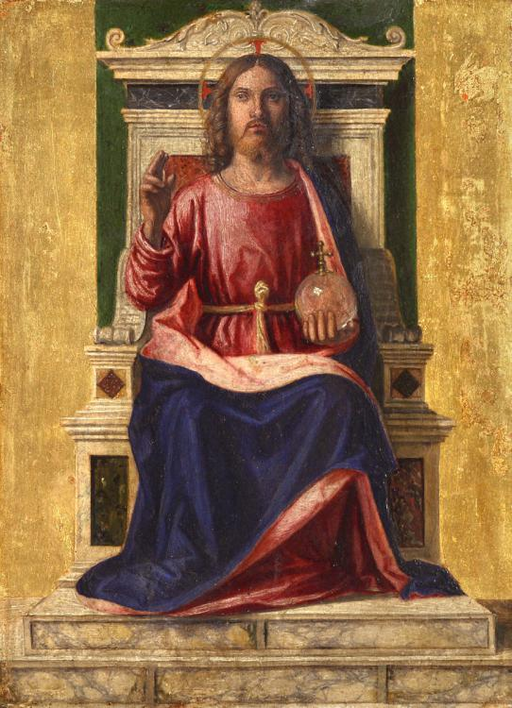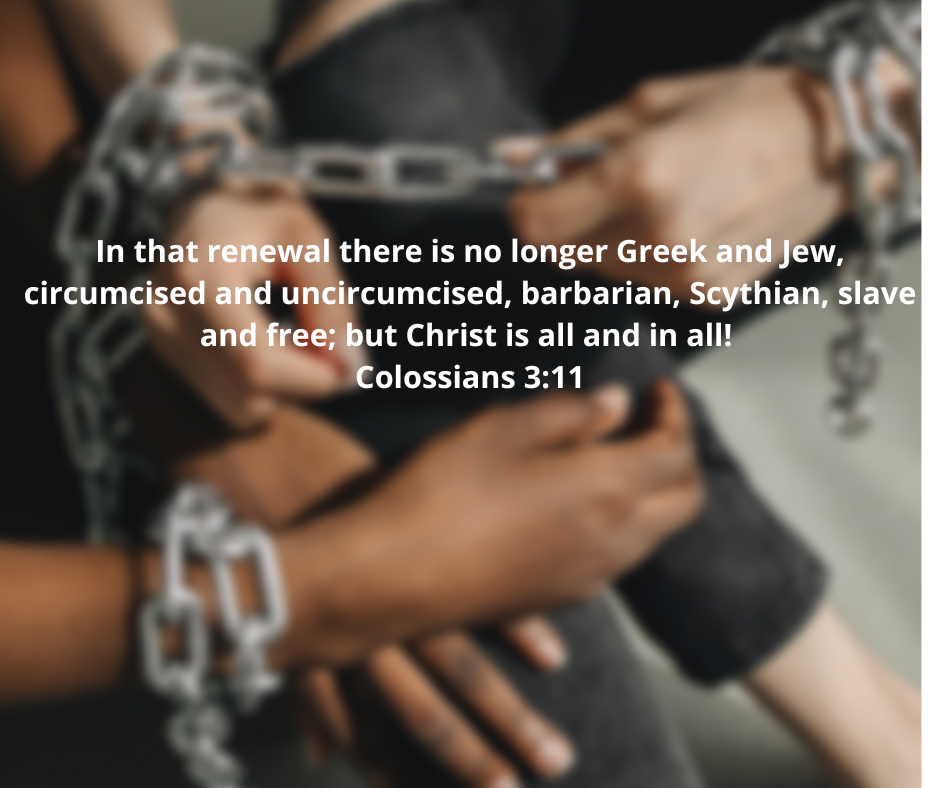Seeing God in Christ and Our Neighbor
Colossians 3:1-11
Eighth Sunday after Pentecost
Analysis by Brad Haugen
1So if you have been raised with Christ, seek the things that are above, where Christ is, seated at the right hand of God. 2Set your minds on things that are above, not on things that are on earth, 3for you have died, and your life is hidden with Christ in God. 4When Christ who is your life is revealed, then you also will be revealed with him in glory.
5Put to death, therefore, whatever in you is earthly: fornication, impurity, passion, evil desire, and greed (which is idolatry). 6On account of these the wrath of God is coming on those who are disobedient. 7These are the ways you also once followed, when you were living that life. 8But now you must get rid of all such things—anger, wrath, malice, slander, and abusive language from your mouth. 9Do not lie to one another, seeing that you have stripped off the old self with its practices 10and have clothed yourselves with the new self, which is being renewed in knowledge according to the image of its creator. 11In that renewal there is no longer Greek and Jew, circumcised and uncircumcised, barbarian, Scythian, slave and free; but Christ is all and in all!

Jesus Christ on the throne by Cima da Conegliano found on Wikipedia
At Jesus’ crucifixion, God was also hidden. The cross hid God from us. And yet, Jesus’ death, followed by resurrection, revealed God to us as nothing else could. It turned out that God came out of hiding for all people in Jesus crucified, died, and raised.
DIAGNOSIS: Looking but Not Finding God
Step 1: Initial Diagnosis (External Problem): Looking Down
We’re exhorted to “set our minds on the things that are above, not on things that are on earth” (v. 2), and yet we do a lot of looking down. We look down on ourselves; we often fail to “measure up” to our own standards and to the actual or perceived standards of other people. When we are out of step with worldly success, we look down on ourselves. Or perhaps we look down on other people whom we judge to be greedier and more selfish than we are. At least we’re not as bad as “those people,” we figure, as we rank ourselves above them in the cosmic order. But then again, there are always “those other people” whose success and excellence we can never attain. So, we’re back to looking down on ourselves. Either way, there’s a lot of looking down—on ourselves and others—rather than setting our minds on the things that are above.
Step 2: Advanced Diagnosis (Internal Problem): Dethroned by the Universe
The recent images captured by the Webb telescope are truly remarkable. The vastness of the universe is breathtaking. Awe and wonder grip us as we gaze at galaxy upon galaxy, beyond what we could have ever imagined or comprehended. We pause for a moment from our looking down to look up.
“What are human beings that you are mindful of them, mortals that you care for them?” the psalmist cries out to God (Psalm 8:4). The cosmic order we glimpse through this most far-reaching telescope certainly confirms our smallness. We don’t look down on the universe. Perhaps the universe looks down on us. Or perhaps the cosmos—in all its mystery, vastness, and grandeur—doesn’t care one way or the other. After all, whether we look down on ourselves and others, whether we treat ourselves and others with “anger, wrath, malice, slander, and abusive language” (v. 8), we don’t alter our place in the universe as glimpsed through the most powerful telescope to date. The universe goes on, with or without us.
Step 3: Final Diagnosis (Eternal Problem): God Hidden
There may not be any obvious cosmic consequences as to whether our planet is here today and gone tomorrow, or as to whether we look down on ourselves and others, and treat each other in ways that God disapproves of, according to Colossians. Nevertheless, there are consequences as far as God is concerned. Unlike the universe—or the cosmos itself, God is personal. God sees, more clearly than any of us, the consequences of our looking down on and not caring for what God has created.
The consequences of our “thoughts, words, and deeds,” and of “what we have done and left undone,” separate us from God and destroy the creation. We work against God rather than with God. The creation to which we belong is not in harmony: all is not well. On our own we cannot see “where Christ is, seated at the right hand of God” (v. 1). Indeed, God remains hidden from us even as we, for the first time, see innumerable galaxies within the vastness of all creation.

Photo by Polina Tankilevitch found on Pexels and edited with Canva
PROGNOSIS: In Christ, God Shows Up for All People
Step 4: Initial Prognosis (Eternal Solution): Hidden with Christ
At Jesus’ crucifixion, God was also hidden. The cross hid God from us. And yet, Jesus’ death, followed by resurrection, revealed God to us as nothing else could. It turned out that God came out of hiding for all people in Jesus crucified, died, and raised. We just couldn’t see God in the death and outpouring of Christ’s life for others until after the resurrection.
“So, if you have been raised with Christ,” Colossians urges us, “seek the things that are above, where Christ is, seated at the right hand of God (v. 1). The promise embedded in this proclamation is: Christ is seated at the right hand of God, and we have been raised with Christ. To be raised, we first had to die—only this death, we didn’t die alone. We didn’t die separated from God. Rather, we died with Christ in our baptism. God’s hiddenness, and our separation from God, have been revealed and overcome by Christ. Our new life with Christ—our resurrection—is safe and secure, hidden with him.
Step 5: Advanced Prognosis (Internal Solution): Enthroned with Christ
Even though we are dethroned by such a vast, mysterious, impersonal, though ultimately incomprehensible (to us) universe—the existence of which in no way depends on whether we are here or not—we nevertheless die and rise with Christ. Christ knows us personally as no one else does, and only he would have us raised with him in glory.
Rather than look down on ourselves and other people, we look to Christ instead. Although we realize how small and how insignificant we are in the vastness of space, we can still trust and hope in Christ. Amid all that there is, including galaxy upon galaxy, still, we believe that “Christ who is our life is revealed” (v. 4). We trust his promise that we “also will be revealed with him in glory” (v. 4).
Until then, the new self that we continually become in our dying and rising with Christ, “is being renewed in knowledge according to the image of its creator” (v. 10). In this way, we are enthroned with Christ and continually assured that our new self is molded, formed, and shaped into the image of God, the Creator. We resist looking down on ourselves and other people; instead, we rejoice and give thanks for the image of God in ourselves and others.
Step 6: Final Prognosis (External Solution): Christ in All
Wherever Christ is, there the renewal of the self happens. And Colossians assures us that “Christ is all in all!” (v. 11). “In that renewal there is no longer Greek and Jew, circumcised and uncircumcised, barbarian, Scythian, slave and free…” (v. 11). The ways in which we rank ourselves above or beneath others in the cosmic order no longer apply.
The “anger, wrath, malice, slander, and abusive language from our mouth” as well as the lies (vv. 8-9) depart from us because we encounter Christ in our neighbors. We therefore listen, respect, serve, and encourage our neighbors. We desire to grow in the truth of the knowledge that we all bear the image of our Creator. Christ is all in all, after all; this promise lifts everyone up.



You must be logged in to post a comment.